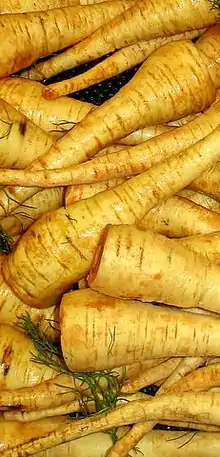parsnip
English

Parsnip roots
Etymology
From 16th-century parsnepe, from Middle English passenep, a modification of Old French pasnaie by influence of Middle English nepe (“turnip”), from Latin pastināca (“parsnip, carrot”), from pastinum (“two-pronged fork”) as in pastināre (“to dig up the ground”).[1]
Pronunciation
- (General American) IPA(key): /ˈpɑɹ.snɪp/
- (Received Pronunciation) IPA(key): /ˈpɑː.snɪp/
Audio (Southern England) (file) - Hyphenation: par‧snip
Noun
parsnip (plural parsnips)
- A biennial plant, Pastinaca sativa, related to the carrot.
- The root of the parsnip, when used as a vegetable.
Derived terms
- cow parsnip (Heracleum spp.)
- cultivated parsnip (Pastinaca sativa vars.)
- fine words butter no parsnips
- giant cow parsnip (Heracleum mantegazzianum)
- giant parsnip (Heracleum spp.)
- golden meadow parsnip (Zizia aurea)
- meadow parsnip
- parsnip chervil (Chaerophyllum bulbosum)
- parsnip moth
- parsnip swallowtail
- parsnip webworm
- poison parsnip (Pastinaca sativa)
- rough parsnip (Opopanax chironium))
- sea parsnip (Echinophora spp.)
- Victorian parsnip (Trachymene sp.)
- water parsnip (Sium spp.)
- wild parsnip (Pastinaca sativa)
Descendants
- → Japanese: パースニップ (pāsunippu)
- → Maori: pānipi
Translations
the plant Pastinaca sativa
|
the edible root of Pastinaca sativa
|
This article is issued from Wiktionary. The text is licensed under Creative Commons - Attribution - Sharealike. Additional terms may apply for the media files.